#cherelle parker
Photo
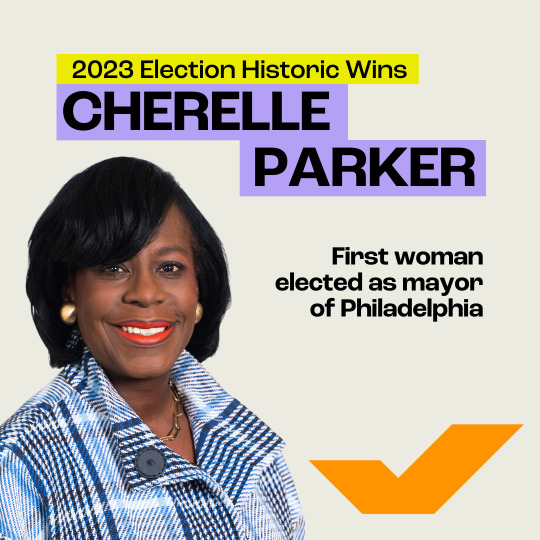

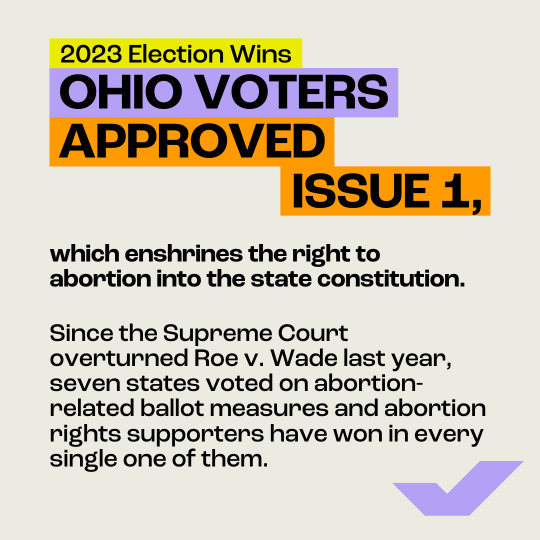


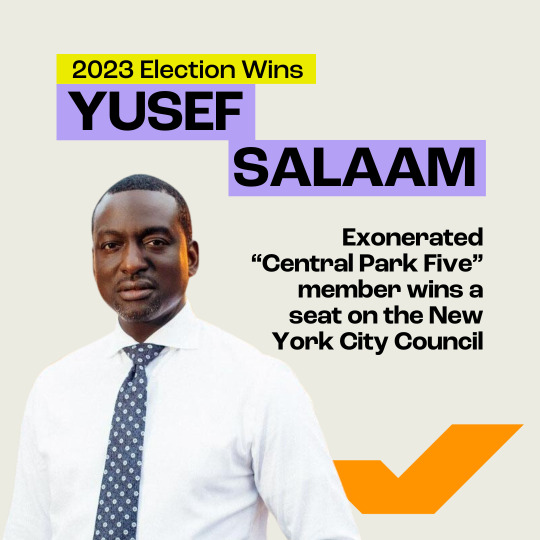

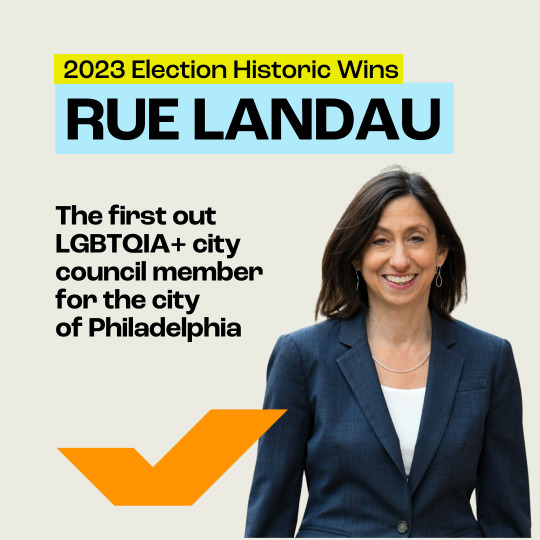
Just some of last night’s historic wins 🥳
#Election 2023#local elections#danica roem#cherelle parker#gabriel amo#yusef salaam#rozia henson#rue landau#ohio
397 notes
·
View notes
Text
Cherelle Parker wins the Philadelphia mayor’s race, NBC News projects, making the Democrat the first female chief executive in the city’s history!

16 notes
·
View notes
Link
Cherelle Parker won the Philadelphia Democratic primary for mayor, the Associated Press called the race Tuesday night.
3 notes
·
View notes
Text
"Research on a police diversion program implemented in 2014 shows a striking 91% reduction in in-school arrests over less than 10 years.
Across the United States, arrest rates for young people under age 18 have been declining for decades. However, the proportion of youth arrests associated with school incidents has increased.
According to the U.S. Department of Education, K–12 schools referred nearly 230,000 students to law enforcement during the school year that began in 2017. These referrals and the 54,321 reported school-based arrests that same year were mostly for minor misbehavior like marijuana possession, as opposed to more serious offenses like bringing a gun to school.
School-based arrests are one part of the school-to-prison pipeline, through which students—especially Black and Latine students and those with disabilities—are pushed out of their schools and into the legal system.
Getting caught up in the legal system has been linked to negative health, social, and academic outcomes, as well as increased risk for future arrest.
Given these negative consequences, public agencies in states like Connecticut, New York, and Pennsylvania have looked for ways to arrest fewer young people in schools. Philadelphia, in particular, has pioneered a successful effort to divert youth from the legal system.
Philadelphia Police School Diversion Program
In Philadelphia, police department leaders recognized that the city’s school district was its largest source of referrals for youth arrests. To address this issue, then–Deputy Police Commissioner Kevin Bethel developed and implemented a school-based, pre-arrest diversion initiative in partnership with the school district and the city’s department of human services. The program is called the Philadelphia Police School Diversion Program, and it officially launched in May 2014.
Mayor-elect Cherelle Parker named Bethel as her new police commissioner on Nov. 22, 2023.
Since the diversion program began, when police are called to schools in the city for offenses like marijuana possession or disorderly conduct, they cannot arrest the student involved if that student has no pending court case or history of adjudication. In juvenile court, an adjudication is similar to a conviction in criminal court.
Instead of being arrested, the diverted student remains in school, and school personnel decide how to respond to their behavior. For example, they might speak with the student, schedule a meeting with a parent, or suspend the student.
A social worker from the city also contacts the student’s family to arrange a home visit, where they assess youth and family needs. Then, the social worker makes referrals to no-cost community-based services. The student and their family choose whether to attend.
Our team—the Juvenile Justice Research and Reform Lab at Drexel University—evaluated the effectiveness of the diversion program as independent researchers not affiliated with the police department or school district. We published four research articles describing various ways the diversion program affected students, schools, and costs to the city.
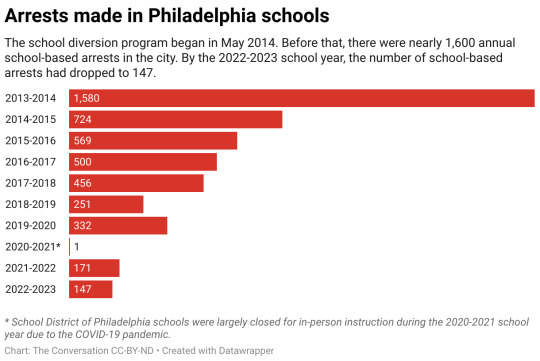
Arrests Dropped
In our evaluation of the diversion program’s first five years, we reported that the annual number of school-based arrests in Philadelphia decreased by 84%: from nearly 1,600 in the school year beginning in 2013 to just 251 arrests in the school year beginning in 2018.
Since then, school district data indicates the annual number of school-based arrests in Philadelphia has continued to decline—dropping to just 147 arrests in the school year that began in 2022. That’s a 91% reduction from the year before the program started.
We also investigated the number of serious behavioral incidents recorded in the school district in the program’s first five years. Those fell as well, suggesting that the diversion program effectively reduced school-based arrests without compromising school safety.
Additionally, data showed that city social workers successfully contacted the families of 74% of students diverted through the program during its first five years. Nearly 90% of these families accepted at least one referral to community-based programming, which includes services like academic support, job skill development, and behavioral health counseling...
Long-Term Outcomes
To evaluate a longer follow-up period, we compared the 427 students diverted in the program’s first year to the group of 531 students arrested before the program began. Results showed arrested students were significantly more likely to be arrested again in the following five years...
Finally, a cost-benefit analysis revealed that the program saves taxpayers millions of dollars.
Based on its success in Philadelphia, several other cities and counties across Pennsylvania have begun replicating the Police School Diversion Program. These efforts could further contribute to a nationwide movement to safely keep kids in their communities and out of the legal system."
-via Yes! Magazine, December 5, 2023
#philedelphia#pennsylvania#united states#us politics#school#high school#school to prison pipeline#prison system#arrests#education#students#schools#good news#hope#rare case of police not completely sucking#police#policing#law enforcement
1K notes
·
View notes
Text

Congratulations, Cherelle Parker! 💙
234 notes
·
View notes
Text
Congratulations!!
102 notes
·
View notes
Text
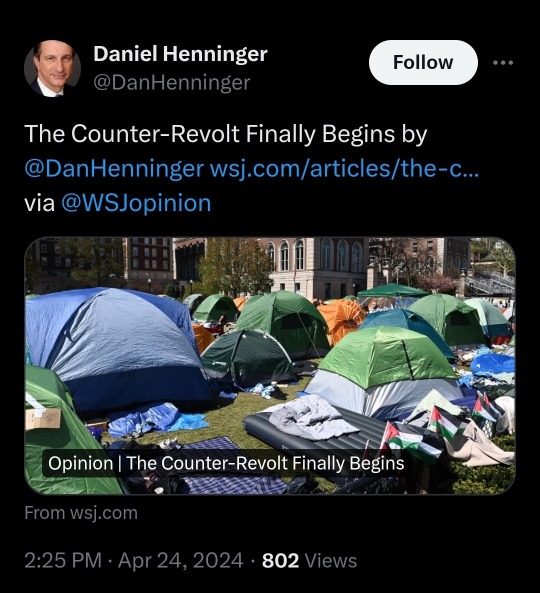
Before this column ends, we’ll get to the unmissable fact that anti-Israel, often antisemitic, protests are proliferating at what we amusingly choose to call our most “selective” universities—Columbia, Yale, New York University, Stanford, Berkeley. For the moment, add these North Face tent protests on $75,000-a-year campus quads to the sense among the American public that their country is running off the rails.
A list of the phenomena laying us low includes: wokeness, DEI (diversity, equity and inclusion), defund the police (a depressing subset of wokeness), conspiracy theories, head-in-the-sand isolationism and a self-centered political polarization typified—from left to right—by Reps. Alexandria Ocasio-Cortez, Ilhan Omar, Cori Bush, Marjorie Taylor Greene, Matt Gaetz and Lauren Boebert.
Ironically this time of year is associated with hope, amid spring and college graduations—except at the University of Southern California, which, fearing trouble, canceled its commencement speakers and told honorary-degree recipients not to show up.
Setting silenced USC aside, a hopeful note one hears at college commencements is that the American system is self-correcting, that despite recurrent stress, it always rights itself. Opinion polls suggest few believe this anymore but—happy spring—it looks as if we may be on the brink of a real counter-revolt against the craziness.
Last week in the hopelessly gridlocked House, Republican Speaker Mike Johnson, facing threats to his job from the chaos caucus, cast his lot with the enough-is-enough caucus. The House passed bills to sustain allies in Ukraine, Israel and Taiwan. Congress isn’t dead—yet.
Blue states and cities that looked willing to collapse rather than defend their citizens have begun to push back against progressives’ pro-criminal and antipolice movements.
At the urging of Gov. Kathy Hochul, New York’s just-passed state budget includes measures to crack down on shoplifting. Assaulting a retail worker will be a felony. Larceny charges can be based on the total goods stolen from different stores. Progressives in the state’s Legislature opposed the measures. Philadelphia Mayor Cherelle Parker, elected in January on restoring law and order (yes, it can be a Democratic issue), last week announced a plan to support policing in the most crime- and drug-plagued neighborhoods.
March seemed to be a tipping point. The hyperprogressive Council of the District of Columbia, in a city that had become an embarrassing carjacking hellhole, passed an array of anticrime measures. Oregon’s Legislature voted to reverse the state’s catastrophic three-year experiment with drug decriminalization. San Francisco voters approved two measures proposed by, of all people, Mayor London Breed, to ease restrictions on policing and require drug screening for welfare recipients. The results in Los Angeles County’s primary for district attorney strongly suggest progressive George Gascón will be voted out in November.
In all these places, the reversals by elected officials are driven by the prospect of voters’ turning them out of office. That is the U.S. political system trying to right itself.
In California, a safety coalition has collected about 900,000 signatures to reverse parts of Proposition 47, the state’s now-notorious 2014 decision to reduce some theft felonies to misdemeanors. This week, the U.S. Supreme Court’s conservative majority appeared sympathetic to overturning a Ninth Circuit decision that bars cities and towns from enforcing vagrancy laws. Though the case emerged from Grants Pass, Ore., which is trying to ban homeless encampments, about three dozen elected officials and organizations in California filed briefs arguing that the Ninth Circuit’s ruling made cleaning up the streets almost impossible.
News stories since the start of the year have noted that many private companies are rethinking policies on DEI, partly under legal pressure, such as the Supreme Court’s decision last year to strike down the use of race in college admissions.
Some in the corporate DEI movement thought they were immune to restraints. No longer. Companies are rediscovering that the constituency most needing inclusion is their customers. The loudest shot across the bow came last week, when Google fired 28 employees after some staged sit-in protests at its New York and California offices over a contract with Israel’s government. Google’s firing statement describes “completely unacceptable behavior.” No one saw that coming.
All this adds up to a nascent counter-revolt against America’s lurch toward self-destruction. The exception is elite U.S. universities. Their leadership has seen itself as answerable to no one and politically immune.
Robert Kraft, a Columbia grad and owner of the New England Patriots, said this week he will no longer give the school money “until corrective action is taken.”
If big donors ever regain control of these so-called selective schools, a suggestion: Firing the president won’t close the barn door. Instead, fire the admissions office. What a tragedy to think how many serious high-school students were rejected by Columbia, Yale and NYU, edged out by nonuseful idiots whose chosen major is the political structure of re-education camps.
Someone has to be a lagging indicator, and these schools are it.
Non-paywall link
8 notes
·
View notes
Text

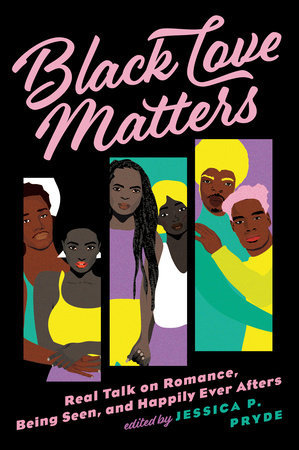

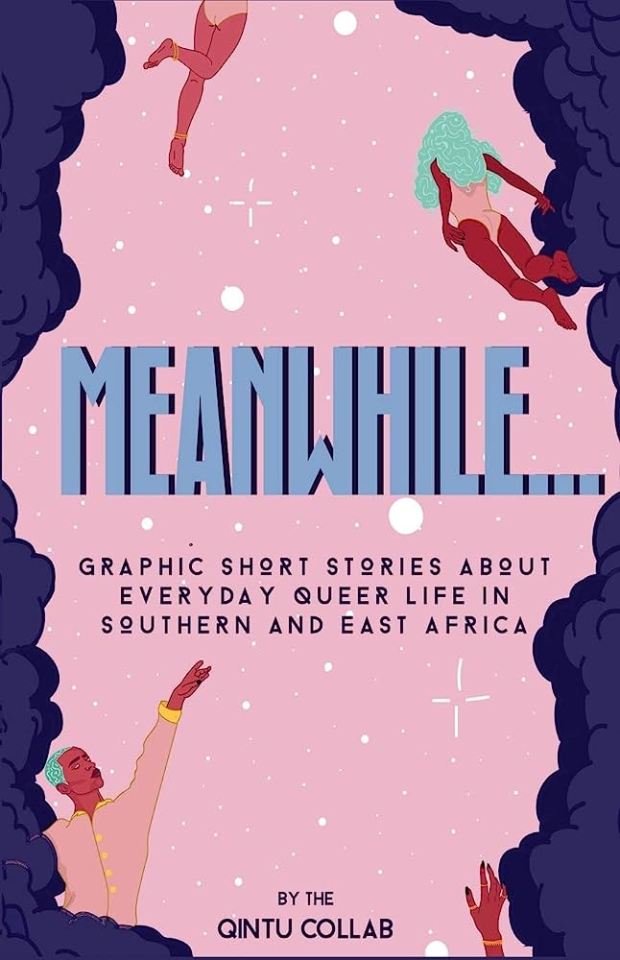
In honor of Juneteenth, we are featuring four books in our collection by queer Black and African authors. Descriptions of the books are below the read more.
Lez Talk: A Collection of Black Lesbian Short Fiction (2016) ed. by S. Andrea Allen & Lauren Cherelle.
Black Love Matters: Real Talk on Romance, Being Seen, and Happy Ever Afters (2022) ed. by Jessica P. Pryde
The Black Imagination: Science Fiction, Futurism and the Speculative (2011) ed. by Sandra Jackson and Julie E. Moody-Freeman
Meanwhile: Graphic Short Stories about Everyday Queer Life in Southern and East Africa (2019) by the Qintu Collab
The Browne Popular Culture Library (BPCL), founded in 1969, is the most comprehensive archive of its kind in the United States. Our focus and mission is to acquire and preserve research materials on American Popular Culture (post 1876) for curricular and research use. Visit our website at https://www.bgsu.edu/library/pcl.html.
Lez Talk
A necessary and relevant addition to the Black LGBTQ literary canon, which oftentimes over looks Black lesbian Writing, Lez Talk is a collection of short stories that embraces the fullness of Black lesbian experiences. The contributors operate under the assumption that "lesbian" is not a dirty word, and have written stories that amplify the diversity of Black lesbian lives. At once provocative, emotional, adventurous, and celebratory, Lez Talk crosses a range of fictional genres, including romance, speculative, and humor. The writers explore new subjects and aspects of their experiences, and affirm their gifts as writers and lesbian women.
Black Love Matters
An incisive, intersectional essay anthology that celebrates and examines romance and romantic media through the lens of Black readers, writers, and cultural commentators, edited by Book Riot columnist and librarian Jessica Pryde.
Romantic love has been one of the most essential elements of storytelling for centuries. But for Black people in the United States and across the diaspora, it hasn't often been easy to find Black romance joyfully showcased in entertainment media. In this collection, revered authors and sparkling newcomers, librarians and academicians, and avid readers and reviewers consider the mirrors and windows into Black love as it is depicted in the novels, television shows, and films that have shaped their own stories. Whether personal reflection or cultural commentary, these essays delve into Black love now and in the past, including topics from the history of Black romance to social justice and the Black community to the meaning of desire and desirability.
Exploring the multifaceted ways love is seen--and the ways it isn't--this diverse array of Black voices collectively shines a light on the power of crafting happy endings for Black lovers.
Jessica Pryde is joined by Carole V. Bell, Sarah Hannah Gomez, Jasmine Guillory, Da'Shaun Harrison, Margo Hendricks, Adriana Herrera, Piper Huguley, Kosoko Jackson, Nicole M. Jackson, Beverly Jenkins, Christina C. Jones, Julie Moody-Freeman, and Allie Parker in this collection.
The Black Imagination
This critical collection covers a broad spectrum of works, both literary and cinematic, and issues from writers, directors, and artists who claim the science fiction, speculative fiction, and Afro-futurist genres. The anthology extends the discursive boundaries of science fiction by examining iconic writers like Octavia Butler, Walter Mosley, and Nalo Hopkinson through the lens of ecofeminist veganism, post-9/11 racial geopolitics, and the effect of the computer database on human voice and agency. Contributors expand what the field characterizes as speculative fiction by examining for the first time the vampire tropes present in Audre Lorde’s poetry, and by tracing her influence on the horror fiction of Jewelle Gomez. The collection moves beyond exploration of literary fiction to study the Afro-futurist representations of Blacks in comic books, in the Star Trek franchise, in African films, and in blockbuster films like Independence Day, I Robot, and I Am Legend.
Meanwhile
The lived realities of young queer people in African contexts are not well documented. On the one hand, homophobic political discourse tends to portray queer people as 'deviant' and 'unAfrican', and on the other, public health research and advocacy often portrays them as victims of violence and HIV. Of course, young queer lives are far more diverse, rich and complex. For this reason, the Qintu Collab was formed to allow young queer people from a few African countries to come together, share experiences and create context-specific, queer-positive media that documents relatable stories about and for queer African youth. We see this as a necessary step in developing a complex archive of queer African life, whilst also personalising queer experiences and challenging prejudicial stereotypes. The Collab is made up of eighteen queer youth from Botswana, Kenya and Zimbabwe, two academics, three artists and a journalist. We first worked in small groups in each country through a range of creative participatory methods that focused on personal reflection and story-telling. Young people created personal timelines, and made visual maps of their bodies, relationships, and spaces. We then had group discussions about themes that emerged to help decide what to include in the comic works. At the end of 2018, we all came together in Nairobi, Kenya, for a week to collaborate on this comic book, and a set of podcasts on similar topics. We worked through various ways of telling stories, and developed significant themes, including family, religion and spirituality, social and online queer spaces, sex, and romantic relationships. Each young person created a script and laid out the scenes for a comic that told a short story from their lives. They then worked one-on-one with an artist to finesse those ideas into a workable comic, and the artists thereafter developed each story through multiple rounds of feedback from the story's creator and the rest of the group
20 notes
·
View notes
Link
1 note
·
View note
Text
Cherelle Parker: A New Hope for Philly's Future!
#affordablehousing #AfricanAmericanwoman #CherelleParker #criminaljusticereform #debateperformance #diversityinleadership #economicdevelopment. #education #endorsements #mayoralelection #PhiladelphiaCityCouncil #povertyrate #povertyreduction #publicschools #publictransportation #smallbusinesses #votersupport
#Politics#affordablehousing#AfricanAmericanwoman#CherelleParker#criminaljusticereform#debateperformance#diversityinleadership#economicdevelopment.#education#endorsements#mayoralelection#PhiladelphiaCityCouncil#povertyrate#povertyreduction#publicschools#publictransportation#smallbusinesses#votersupport
0 notes
Text
Mayor Parker calls for all city workers to return full-time, in person: 'We are not a virtual administration'
0 notes
Text
Philadelphia Mayor Cherelle Parker orders top city officials to return to offices full time
The mayor is staring wiry higher level executives but eventually wants all city employees back in the office..
"I want a thriving downtown. I want to see more people walking in our city, and quite frankly, going in and out of our stores, spending money, helping to strengthen the economy. And quite frankly, when people see more folks walking in our city and you see more bodies, it feels safer," said Parker.
0 notes
Text
PHILADELPHIA (AP) — Philadelphia Police Commissioner Danielle Outlaw will step down this month to take a leadership position with the Port Authority of New York and New Jersey, the mayor said Tuesday.
Outlaw, the first Black woman to run the 6,000-member police department, came to Philadelphia from Portland, Oregon, where her handling of protests had raised concerns.
She leaves after a bumpy three years on the job that began just before the pandemic lockdowns and was quickly followed by intense protests that broke out in Philadelphia and across the country in the summer of 2020 over the police killing of Black people.
Outlaw’s resignation comes just a few months before the end of Mayor Jim Kenney’s tenure, and as crime rates including homicides and gun-related crimes have become a major issue in the race for who will replace him. While campaigning, Democratic candidate Cherelle Parker has skirted questions over her plans for leadership at the police department.
Over the last few years, Philadelphia has seen a sharp increase in homicides, setting a modern-day record in 2021 with 562 homicides that year. Homicides declined slightly in 2022 and advocates have said they are on track to decrease further this year. But even though Philadelphia was hardly alone among U.S. cities in experiencing a rise in homicides over that time, it has had a hard time combatting a Republican narrative of being a Democratic city with a progressive district attorney that is overrun with violence and danger.
At the port authority, Outlaw will be the deputy chief security officer.
Outlaw, whose last day as commissioner is Sept. 22, leaves months before Kenney’s two terms as mayor come to an end. The mayor has named First Deputy John M. Stanford Jr. as interim police commissioner.
“Commissioner Outlaw has worked relentlessly for three and a half years during an unprecedented era in our city and a number of crisis situations, and she deserves praise for her commitment to bring long-overdue reform to the Department after years of racism and gender discrimination prior to her appointment,” Kenney said. “We wish her success in her new position and thank Commissioner Outlaw for her dedication to serve the residents of Philadelphia.”
10 notes
·
View notes
Text
0 notes
Text
mayor cherelle parker im [for legal reasons this statement is redacted]
1 note
·
View note
Text
Cherelle Parker talks Philly education, year-round school - WHYY
From Philly and the Pa. suburbs to South Jersey and Delaware, what would you like WHYY News to cover? Let us know! Philly's own Cherelle Parker …
View On WordPress
0 notes